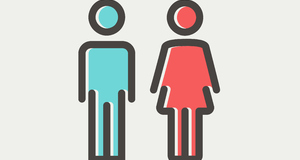How Do I Look? The Impact of Compliments on Self-Perceived Attractiveness
By
2013, Vol. 5 No. 09 | pg. 1/3 | »
IN THIS ARTICLE
KEYWORDS
AbstractThe present study investigates the effect of a compliment on self-perceived attractiveness and then compares this effect between genders. Participants (48 university students, consisting of 24 females and 24 males with a mean age of 20.25 [SD = 1.26]) were asked to complete a questionnaire about self-perceived attractiveness, with half of each gender doing so immediately after receiving a subtle complement. Analysis found a significant main effect of the compliment, but no significant main effects of gender or the interaction of the two variables. The findings imply that compliments lead to higher self-perceived attractiveness in both genders and that the gender gap for self-image and self-perceived attractiveness may be shrinking. Further research can yield more results about gender differences. Beauty is often perceived as one of the more pleasant aspects of life, and its influence is often almost unavoidable. There is no denying its value to society - much time and effort has been devoted to its portrayal, and continues to in the present day. Many humans, for example, put a significant amount of effort into their appearance, thus hoping to change how others perceive them. To such humans, their self-perceived attractiveness seems to be of great importance. Links have been found between self-perceived attractiveness and many other aspects of mental health, such as self-esteem, thus further emphasizing its importance. It is important to define what constitutes as self-perceived attractiveness. Women, for example, tend to take affective and cognitive factors into consideration when perceiving their own attractiveness rather than simply focusing on the physical aspects (Cooper & Wade, 1999). This adds a certain level of complication – how exactly does a researcher want to measure a subject’s scores? Because of the countless components which may be taken into account when considering one’s self-perceived attractiveness, it is difficult to measure accurately due to how many possible ways there are for it to be measured. Variables unconsciously taken into consideration by participants, aside from actual physical attractiveness, tend to include aspects like wealth, parenting ability, sociality, relationship history, and so forth (Bennett, Cox, Fisher, & Gavric, 2008). For the purposes of this study, self-perceived attractiveness will be focused on in its simplest and shallowest form, involving the physical beauty of the participant alone.Significant difference in the self-perceived attractiveness of the genders has been found, with women constantly scoring lower than men on such scales (Ashton & Nell, 1996). This may be because of self-esteem issues, since women tend to report higher body surveillance and more body dissatisfaction than men (Calogero & Herbozo, 2009), but the role of the perceptions that others have also plays a major part in this effect. Women have been found to be more sensitive to the feedback of those around them, which leads to a greater worry about appearance, and, thus, higher standards set for their own attractiveness (Hall & Rand, 1983). In essence, because women care more, they score lower because they are simply unable to keep up with the standards which they set for themselves. Surprisingly, it has been found that women actually have more accurate ideas of their own attractiveness than men do. When their self-perceived ratings were compared to those made of them by males, it was shown that females were far more accurate in their ratings than men were (Hall & Rand, 1983); males actually had no correlation between self-perceived scores and those provided of them by women (Cooper & Wade, 1999). This difference has several implications – men are more oblivious to the judgment of their physique by those around them, thus leading to higher self-image and less care devoted to securing a positive impression. Because of this, it can be predicted that males will both not be affected by compliments as much of an extent as females (as a product of not being oblivious to the need for accuracy) and will present with a higher mean self-perceived attractiveness in general. A woman’s idea of self-perceived attractiveness is significantly more variable than a man’s. In studies where women compared themselves to ads, they found that women with lower self-perceived attractiveness were more negatively affected by advertisements that promoted the Media’s “ideal image” (Knee, Neighbors, & Patrick, 2004). In a sense, these examples of society’s image of beauty act the opposite way that compliments do, allowing for a woman to compare herself to those considered to be more attractive than her instead of emphasizing what positive features she may have. A compliment could, theoretically, have the opposite effect, thus boosting the scores of self-perceived attractiveness. It is theorized that this may be caused by the extent to which one is able to be in control of their appearance – women are able to do many things (such as wear makeup, do their hair, don provocative clothing, and so forth) to change their attractiveness, so their self-perceived attractiveness tend to focus more on how they believe others perceive them, whereas many of the things that may change one’s appearance are considered not to masculine, and thus are avoided by men (Hall & Rand, 1983). Because of this, more effort on the part of the woman tends to be reinforced by society, whereas little such positive reinforcement occurs for males, leading to less care about the perceptions of others. However, not all compliments are created equal. Not only does the gender of the receiver matter, but the gender of the provider of the compliment is crucial as well, at least in women. When females were complemented by males, the compliments were generally accepted, whereas compliments from other women had a tendency to be either ignored or not entirely welcomed (Herbert, 1990). Women tend to either provide more white lies than men do or compliment features which they dislike, which may lead to this gender bias. Men, on the other hand, tend to be more genuine in what they say, or at least be blunter. In addition to this, compliments directed toward the group were generally not taken as seriously as those directed toward individuals (Garcia, Miller, Mackie, & Smith, 2006). The correct compliment, however, would retain its ability to sway the person to whom it is given. However, because of the wide array of compliments in existence and many possible reactions to them, a uniform compliment would be required in a study about this. The current study examines the relationships between both the gender of the participant and the presence of a compliment on self-perceived attractiveness, both individually and their interaction effect. Participants are provided with short questionnaires about their self-perceived attractiveness, with the experimental group having been complimented moments before being handed the questionnaire. It is predicted that females will report lower average self-perceived attractiveness scores than males, and that the effect of compliments on self-perceived attractiveness will be visible in a positive way on both genders, but more so in females.Continued on Next Page » Suggested Reading from Inquiries Journal
Inquiries Journal provides undergraduate and graduate students around the world a platform for the wide dissemination of academic work over a range of core disciplines. Representing the work of students from hundreds of institutions around the globe, Inquiries Journal's large database of academic articles is completely free. Learn more | Blog | Submit Latest in Psychology |


















